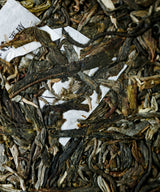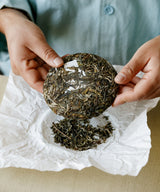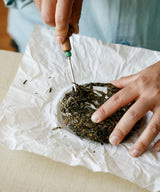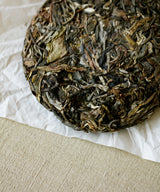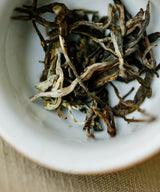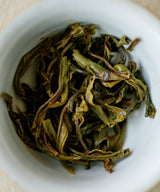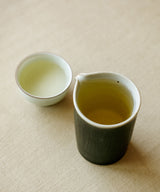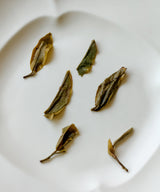Ancient Spring "Orchid"
古树春“兰香”生普洱
Harvest
April 2022 / April 2023
Origin
Jinggu, Yunnan
Mr. Tang left his corporate job in the city, Kunming, in 2006. He had rented a small
Mr. Tang left his corporate job in the city, Kunming, in 2006. He had rented a small place in rural Yunnan where his only intentions were to read, reflect, and drink tea with friends. In one of these conversations an old friend, Li, suggested that Tang grow tea in Li’s hometown, Yangta Village. That July the two of them traveled to Jinggu in Yangta and leased 11 acres of forested area from Li’s niece.
The area they leased was wild growth, at about 6500 ft elevation. This is where they would eventually plant 70,000 Jinggu Big White tea trees. However, Tang found out, somewhat far into the process of planting, that one cannot harvest newly planted tea trees until they have stood in the ground for 3 years. Confronted with this long pause, Tang leased another tea garden in the mountain that locals had shown him; a highly regarded area that was home to ancient pu’erh trees. And so, while he waited for his Jinggu Big Whites, Tang began making pu’erh from these very old trees.
Ancient Spring Orchid is from a very old tea garden, made up of trees that were planted by the great-grandfather of a local villager and are now between 100 and 150 years old. Fewer than 200 trees of the Mengku varietal grow together here, as they have for generations. The garden sits at 6,000 ft elevation, slightly above the grove where Tang harvests his tea for Ancient Spring. It is found deep in the woods on the West facing side of the mountain, and is only accessible by a steep trek through the dense pine forest.
Tang crafts Ancient Spring Orchid exclusively from first harvest leaves in the Spring. The tea trees are only harvested once a year, so that all their energy concentrates in their first flush. The leaves of the Mengku trees are blended with leaves from the locally indigenous Jinggu Dabai varietal. The result is an outstanding pu’erh, that expresses the strength and character of the trees it was made from.
We would say that this tea has a strong “cha qi” or “tea energy:” the tea is full-bodied and deep, and the energy from the trees can be felt as you drink it. It has distinct floral notes, referenced by its name, “orchid,” and the depth and complexity increases with each infusion. We drink this tea to feel enlivened, to move energy through ourselves, and to encounter the specific and enchanting characteristics of old grove Mengku.
. . .
Brewing guide
| Tea | 4 g |
| Temperature |
100°C |
| Water | 120 ml |
| Steep time | 10 - 60 sec |
| No. of infusions | 10 |

